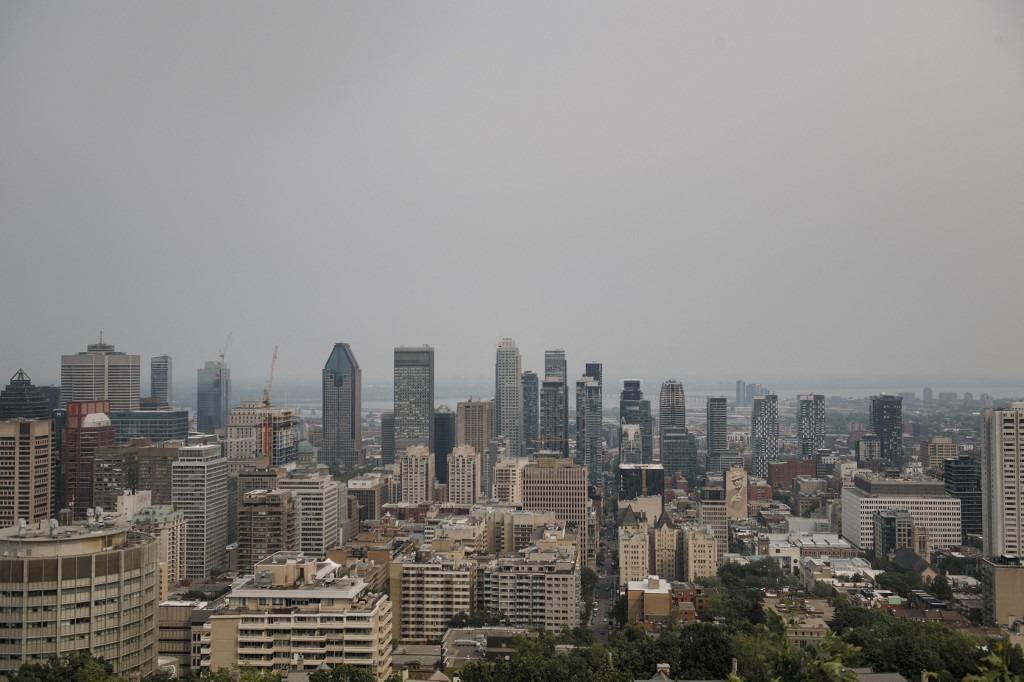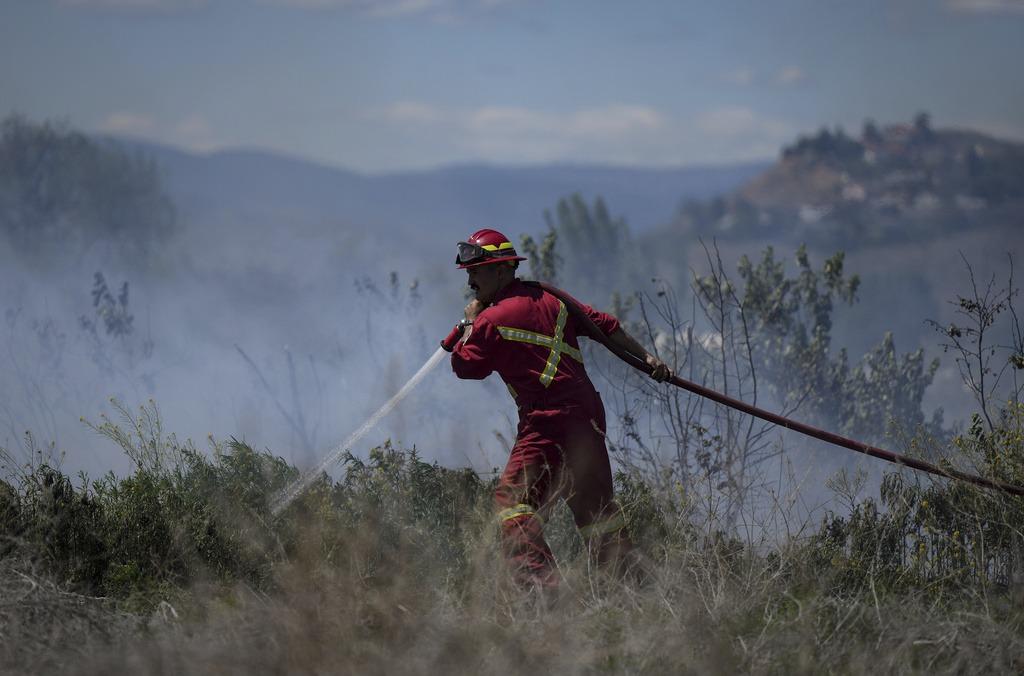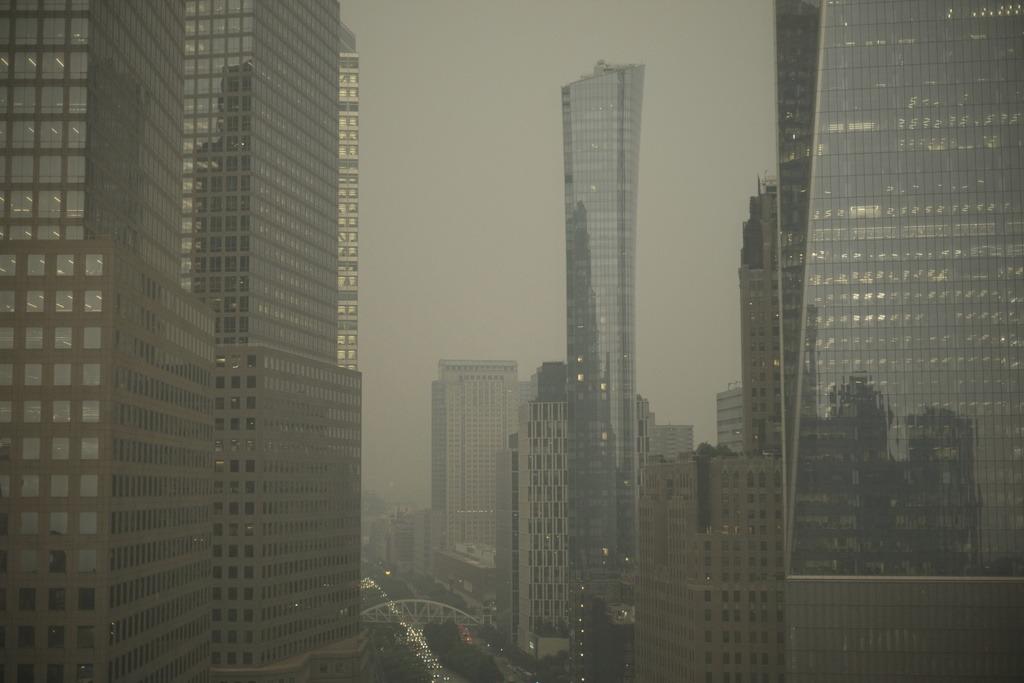 Smoke fills the air as the city of Montreal is seen from the chalet on top of the Mont Royal in Montreal, Quebec, Canada, on June 5, 2023. (PHOTO / AFP)
Smoke fills the air as the city of Montreal is seen from the chalet on top of the Mont Royal in Montreal, Quebec, Canada, on June 5, 2023. (PHOTO / AFP)
OTTAWA - Authorities in New York, Toronto and Ottawa on Tuesday warned residents about the health risks from air polluted by smoke from unprecedented early summer wildfires in western Quebec and northern Ontario near Canada's capital city.
An unusually early and intense start to wildfire season has set Canada on track for its worst-ever year as warm and dry conditions are forecast to persist for months.
There are blazes in nearly all of Canada's 10 provinces and territories, with Quebec the worst impacted due to multiple fires caused by lightning.
Canadian capital city Ottawa, which neighbors Quebec, was covered in haze on Tuesday morning, with air quality in category 10+, the worst level on Environment Canada's Air Quality Health Index, indicating "very high risk"
The air quality of Ottawa was so bad that it cracked through the top of a risk scale. Environment Canada warned that forest fires may keep the air dangerous to human health through most of the week.
The Canadian capital, which neighbors Quebec, was covered in haze on Tuesday morning, with air quality in category 10+, the worst level on Environment Canada's Air Quality Health Index, indicating "very high risk".
This meant the general public should reduce or reschedule strenuous outdoor activities, and people at risk of serious health problems from pollution, including seniors, young children and pregnant people, should avoid these types of activities.
By early afternoon, it settled down to 10, which was still high.
ALSO READ: Canada wildfires spread to new areas, thousands more evacuated
The air over Toronto was also polluted and conditions could persist through most of this week, the government run weather agency said.
 A firefighter directs water on a grass fire on an acreage behind a residential property in Kamloops, British Columbia, on June 5, 2023. (PHOTO / AP)
A firefighter directs water on a grass fire on an acreage behind a residential property in Kamloops, British Columbia, on June 5, 2023. (PHOTO / AP)
Wildfires are common in Canada's western provinces, but this year flames have been mushrooming rapidly in eastern Canada, forcing home evacuations and the federal government to send in the military.
Monica Vaswani, warning preparedness meteorologist for Environment and Climate Change Canada, said the air quality index maxes out at 10 for forecasting purposes. But Ottawa's readings actually hit as high as 14 on an internal scale on Tuesday, double what the ministry requires for issuing an air quality statement
About 3.3 million hectares have already burned - some 13 times the 10-year average - and more than 120,000 people have been at least temporarily forced out of their homes.
Monica Vaswani, warning preparedness meteorologist for Environment and Climate Change Canada, said the air quality index maxes out at 10 for forecasting purposes. But Ottawa's readings actually hit as high as 14 on an internal scale on Tuesday, double what the ministry requires for issuing an air quality statement.
"That just gives you an idea that it is definitely, in some ways, off the charts," she said.
"Don't expect a return to normal anytime soon," Vaswani said, adding that winds from the north and northeast will keep pushing plumes of smoke from Quebec toward Ottawa.
There's also little sign of significant rainfall over the workweek or longer and the forest fires might actually prevent rain from forming, she noted.
"Unless the forest fires themselves reduce in some fashion, the weather is not going to change really," she said. "So more likely than not the air quality is going to remain ... bad."
ALSO READ: Canada's Alberta faces more wildfires amid hot, dry weather
Environment Canada still has smog warnings for areas north and east of Gatineau and special air quality statements for the rest of eastern Ontario and western Quebec.
Vaswani said the poor air quality in Ottawa is driven by high levels of fine particulate matter in the air from the forest fires. As of Tuesday at 8 am, Ontario's Ministry of Environment, Concentration and Parks was reporting levels of that pollutant well in excess of healthy levels. Concentrations of fine particulate matter were 267 micrograms per cubic meter.
 Buildings in lower Manhattan in New York are partially obscured by smoke from Canadian wildfires on June 6, 2023. (PHOTO / AP)
Buildings in lower Manhattan in New York are partially obscured by smoke from Canadian wildfires on June 6, 2023. (PHOTO / AP)
Canada's Foreign Minister Melanie Joly on Tuesday thanked United States, Mexico, South Africa and France for sending in firefighters to help.
Environment Canada still has smog warnings for areas north and east of Gatineau and special air quality statements for the rest of eastern Ontario and western Quebec
"I want to highlight that people need to continue to listen to local authorities on how to stay safe, including in places like Ottawa that are affected by smoke from wildfires," Canadian Prime Minister Justin Trudeau told reporters in Ottawa.
ALSO READ: Wildfires in Canada's main oil province force producer shutdowns
The poor, dangerous air quality across the Ottawa-Gatineau region meant some events have been canceled or changed.
Schools have cancelled outdoor extracurriculars and were keeping students inside at recess Tuesday.
Some schools have also canceled outdoor activities for Wednesday with more smoke in the forecast.
The Ottawa Sport & Social Club and Soccer Outaouais have canceled all outdoor games Tuesday. The Eastern Ontario District Soccer Association said it has cancelled all games "under its control" and has encouraged its clubs to cancel practices.
The Ottawa Redblacks have changed Tuesday's practice to an indoor walkthrough.
READ MORE: Western Canada wildfires prompt state of emergency, evacuations
The City of Ottawa has cancelled all outdoor recreational programs and leagues taking place on Tuesday. Drop-in programs will move indoors, where possible.


